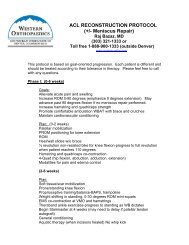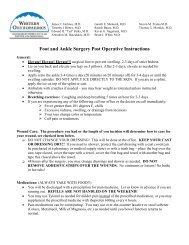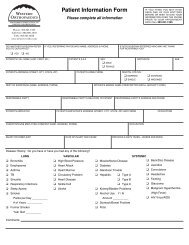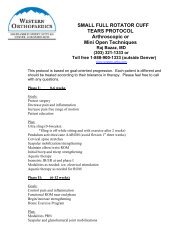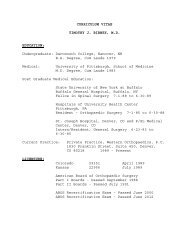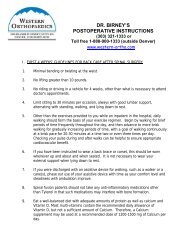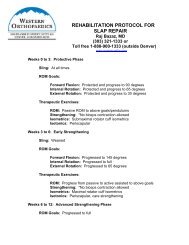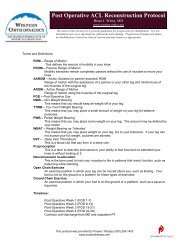Anterior Hip
Anterior Hip
Anterior Hip
- No tags were found...
You also want an ePaper? Increase the reach of your titles
YUMPU automatically turns print PDFs into web optimized ePapers that Google loves.
AnesthesiaAnesthesia is defined as the loss of feeling orconsciousness. During your surgery, theanesthesiologist will provide the anesthesia andconstantly monitor your medical condition.Your anesthesiologist will be assigned 24 hoursprior to your surgery. He/She will personallyinterview you and examine you the day of surgery.You will have two options for your anesthetic:general anesthesia or regional anesthesia.General AnesthesiaThe main purposes of general anesthesia are:• pain relief (analgesia)• inhibits normal body reflexes to makes thesurgery safe and easier to preform• relaxes the muscles of the body• produces unconsciousness• blocks the memory of the procedure(amnesia)With general anesthesia, you will be unconsciousthroughout the entire operation. You will receive anintravenous injection that producesunconsciousness within a few seconds and then ananesthetic gas will maintain the anesthesia until theend of the surgery. During surgery you may have atube placed in your throat to deliver inhaledanesthesia. This tube may cause you to have a sorethroat or hoarse voice for a few days after surgery.off, however if they persist or cause problems, yournurse or physician should be notified.Regional AnesthesiaRegional anesthesia such as spinal or epidural is analternative to general anesthesia and affects onlythe portion of the body that is to undergo surgery.A small area of skin is numbed by a local anestheticinjection and a needle is placed between the bonesof the lower back and the anesthetic drug isinjected. With this technique, medication isdelivered in the spinal area of the lower back tonumb the nerves that carry sensation andmovement messages from the brain to the lowerpart of the body.In addition to regional anesthesia, you will besedated to help you relax throughout theoperation. The extent of sedation is determined bythe anesthesiologist and is based on yourdiscussion with he/she before surgery.If regional anesthesia is used, patients are usuallyaware of events in surgery though they do not feelpain.We’re here for YOU!Please feel free to talk to your anesthesiologist,surgeon or nurse if you have any questions orconcerns about your anesthesia options.During the surgery, the anesthesiologist constantlymonitors your breathing, heart rate, blood pressureand body temperature. At the conclusion of thesurgery, the anesthesiologist slowly reduces theamount of anesthetic drugs so that you awakensoon after your operation is finished.Because general anesthesia affects the centralnervous system, patients may feel drowsy, weak ortired for as long as a few days after. Most sideeffects usually disappear as the anesthetic wears




